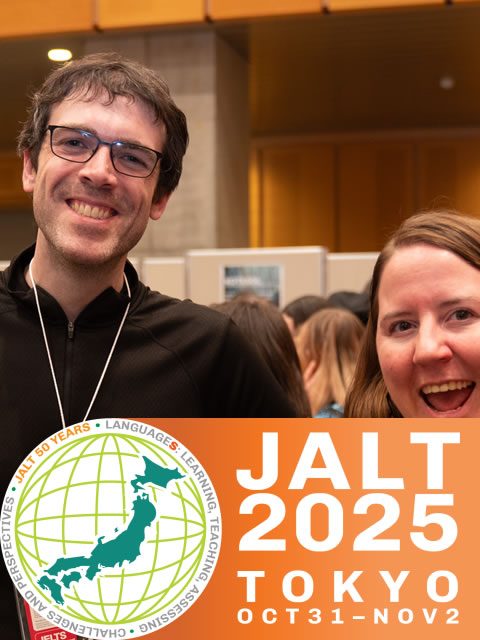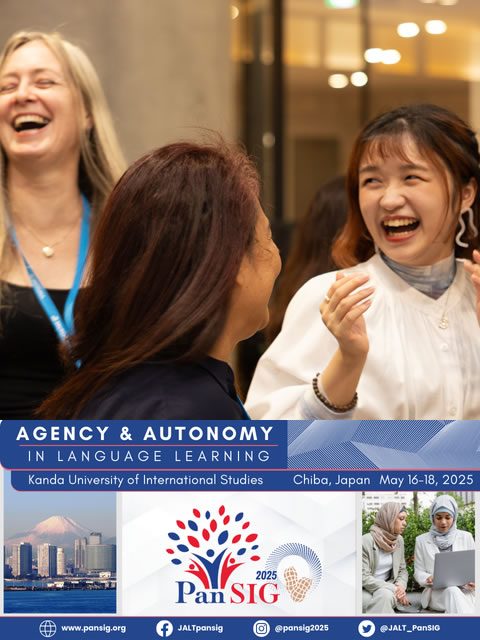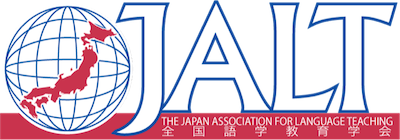Your cart is currently empty!
Featured Speakers
•
Joseph Shaules
Sandra McKay
Louise Haynes
Dat Bao
Justin Harris
John Hughes
Joseph Shaules
Sponsored by Mind, Brain, and Education (BRAIN) SIG
Brain Guide to Interculture in Language Classrooms
Saturday November 24, 4:40 PM – 5:40 PM, Room 1001-2
Although language and culture are closely related, adding an intercultural dimension to language classes can be challenging. This presentation will present a “deep learning” approach to doing so. We will learn about four levels of learning that help us include cultural elements into foreign language classes, drawing on insights in cognitive neuroscience and unconscious cognition. This presentation is intended for teachers who see language learning as an opportunity for increased intercultural understanding.
Additional Presentation: Mind, Brain and Motivation
Sunday November 25, 2:50 PM – 3:15 PM, Kaigi Hall (11F)
Many teachers complain about demotivated students. This presentation will argue, however, that common ideas about de/motivation are at odds with recent insights in brain and mind sciences. We will discuss a new approach to understanding student engagement based on the notions of resistance and engagement. We will see that negative attitudes are a normal part of foreign language learning. Participants will have the chance to share their thoughts and experiences.
Joseph Shaules is a leading author and educator in language and intercultural education. He is a full professor at Juntendo University, and is the director of the Japan Intercultural Institute. Books include: Identity (Oxford University Press); Impact Issues (Pearson); The Intercultural Mind (Intercultural Press); Deep Culture (Multilingual Matters). He has lived and worked in Mexico, Japan, and France, and is proficient in English, Spanish, Japanese, French and Indonesian.
Sandra McKay
Sponsored by Tokyo JALT Chapter and CUE SIG
The Need for Diversity and Inclusion in ELT Texts
Sunday November 25, 2:15 PM – 3:15 PM, Room 1001-2
The presenter will argue that since English is now an international language, it essential for ELT materials to prepare students to use English with individuals from a wide array of cultures. The workshop will present examples of ELT materials from different contexts in order to assess the extent to which they are culturally sensitive. Participants will then be asked to consider how they might be improved to be more internationally diverse and inclusive.
Additional Presentation: Evaluating the Cultural Content of ELT Texts
Saturday November 24, 12:10 PM – 12:35 PM, Room 1001-2
In this workshop, participants will be given a set of questions regarding the cultural content of ELT textbooks used primarily in ELF countries. Based on these questions and discussions among their group, participants will draft a rubric to assess ELT textbook’s cultural content. This rubric will hopefully be valuable for teachers in the future to assess the textbooks they are currently using.
Sandra McKay is Professor Emerita of English at San Francisco State University. Her main areas of work and research are second language teacher education and sociolinguistics (with a focus on English as an international language). Her books include Sociolinguistics and Language Education (edited with Nancy Hornberger, 2010, Multilingual Matters) and Teaching and Assessing EIL in Local Contexts Around the World (with J.D. Brown, 2016, Routledge). She has also published widely in international journals.
Louise Haynes
Sponsored by GALE SIG
Student Choice and Songs of Social Significance
Saturday November 24, 11 AM – 12 PM, Room 1001-2
My course “Songs of Social Significance” looks at a variety of songs ranging from the Spanish Civil War (and Cataluña today), Salvador Allende in Chile in the 1970s, the Civil Rights Movement in the US, and protest music of the Vietnam and Iraq wars. Participants will discuss ways to teach issues such as environmental destruction in Vietnam, LGBT movement, women’s rights, and nuclear issues in Japan in a respectful, inclusive manner.
Additional Presentation: Student Choice, Motivation, and Inclusion
Sunday November 25, 4:35 PM – 5 PM, Room 1001-2
This presentation focuses on how to raise social issues, why we should, and what doing so means for individual students who may otherwise feel alone in their experience or opinions. The speaker will discuss personal experiences in dealing with controversial topics in the EFL classroom and offer suggestions as to how to give students choice when raising issues, and what that might mean for improvement in overall language skills, improved critical thinking, and higher self-esteem.
Louise Haynes has had a long-term teaching and activist presence in Japan, and has done valuable work in diverse areas such as AIDS awareness and prevention, and the teaching of controversial topics. Her current research interests are content analysis of protest music during the Spanish Civil War and music worldwide that deals with social issues. She has an MScTESOL and an MBA from Anaheim University. She is currently a vice-director of the language program at Nagoya City University.
Dat Bao
Sponsored by LiLT SIG, C Group and Pilgrim
Creative Use of Visual Images for the L2 Classroom
Saturday November 24, 12:45 PM – 1:45 PM, Room 1001-2
This workshop describes the theoretical principles underlying visual pedagogy, and shows how those ideas can be applied to the production of creative and inclusive classroom activities that reflect the diverse needs of students. The speaker introduces a set of strategies for reducing the teacher’s reliance on course book visuals that enables them to use cartoons, drawings, and photography resources in inspiring ways. Finally, participants will have the opportunity to engage in the practical creation of visuals.
Additional Presentation: Towards a Different Learning Model
Sunday November 25, 1:40 PM – 2:05 PM, Room 1001-2
An inclusive and flexible communicative approach to TESOL has never been more needed in our diverse, globalised society. A group of Japanese in Australia are acting as independent agents of their own English language learning, developing methods, creating interest groups, and learning new skills unavailable to them in the Japanese education system. Observations related to one group’s approach to language learning are described and the transferability of this learning model to other contexts is discussed.
Dat Bao is a senior lecturer in Monash University, Australia. Previously he has worked with universities in the USA, UK, Thailand, and Singapore. His expertise includes curriculum design, intercultural communication, materials development, creative pedagogy and visual pedagogy in language education. He is the author of Understanding Silence and Reticence: Nonverbal Participation in Second Language Acquisition (Bloomsbury, 2014) & Creativity and Innovations in ELT Material Development: Looking beyond the Current Design (Multilingual Matters, 2018).
Justin Harris
Sponsored by Abax Ltd.
TBLT: What is it? What is it NOT? What Can it Be?
Sunday November 25, 9:15 PM – 10:15 PM, Room 1001-2
Although TBLT is increasing in popularity, many teachers admit to confusion over what is, and what is not a task. This workshop aims to clarify the key tenets of TBLT while dispelling some common myths. Results of an ongoing survey will be presented which looks at how many teachers in Japan are “getting on with” the practice of TBLT, what TBLT is, and is not, and how it can be successfully implemented in Japan.
Additional Presentation: An Input-Output Task Integrated Framework
Saturday November 24, 12:10 PM – 12:35 PM, Room 910
This workshop outlines an approach to TBLT that can be used in general English classes in Japan. Building on Willis’s Task-Based Learning Framework, the Input Output Task Integrated Framework provides students with exposure to language through reading tasks. The language and content of the reading, or input task, relates to the subsequent output tasks, that is, it is a potential resource for those who may need it. Examples of this framework will be presented.
Justin Harris is an associate professor at Kindai University in Osaka. He is a founding member and coordinator of the JALT TBL SIG and has worked as Conference Chair for four TBLT in Asia conferences. Justin’s other main research interest is English as a Lingua Franca, especially regarding the continued prevalence of the Native Speaker Model in Japan. He combined these interests when cowriting the new OnTask textbook series for ABAX.
John Hughes
Sponsored by National Geographic Learning
Make Critical Thinking a Part of your Classroom
Sunday November 25, 12:30 PM – 1:30 PM, Room 1001-2
What does Critical Thinking really mean for the English language learning classroom? In this practical talk, I’ll place critical thinking in the context of lower and higher thinking and look at why it’s relevant to English language teaching. I will demonstrate how critical thinking has a positive impact on your lesson-planning and extends your range of classroom activities. This presentation will give you a variety of ideas to use with your students tomorrow.
Additional Presentation: Personalization in an Impersonal World
Saturday November 25, 5:50 PM – 6:15 PM, Room 1001-2
Personalization in the classroom is an effective way to draw on the rich diversity of students’ own experience to make language more memorable. And yet, asking students to express personal feelings in front of their peers also comes with inherent challenges. In this presentation, I’ll consider how teachers can build an inclusive classroom with a variety of practical personalization activities which bridge the gap between the individual, the language and the wider world.
John Hughes is an award-winning ELT author with over 30 titles. His books for National Geographic Learning include the course series Life, Practical Grammar, Success with BEC Vantage and Total Business. In his 25-year career, he has taught students from all over the world and managed departments of Business English and Teacher Training. He has also lectured on ELT materials writing at Oxford University. His blog is www.elteachertrainer.com.

JALT2025 International Conference
2025年10月31日(金)〜2025年11月02日(日) 東京都渋谷 国立オリンピック記念青少年総合センター Friday, October 31 – Sunday, November 02, 2025 • National Olympics Youth Memorial Center, Tokyo, Japan

PanSIG Conference
PanSIG 2025 will be held May 16-18 in Chiba. PanSIG is an annual conference organized by JALT’s Special Interest Groups (SIGs).
